
This post may contain affiliate links. For detailed information please go to Disclaimer.
About the Design
Last winter, I wanted to make something for the upcoming spring. Every year, as spring approaches, I switch my knitting to lace knitting. But winter here is so long. It can be snowing on easter day. So I wanted a lace pattern but still heavy enough to keep me warm. That’s when I made this lace scarf.
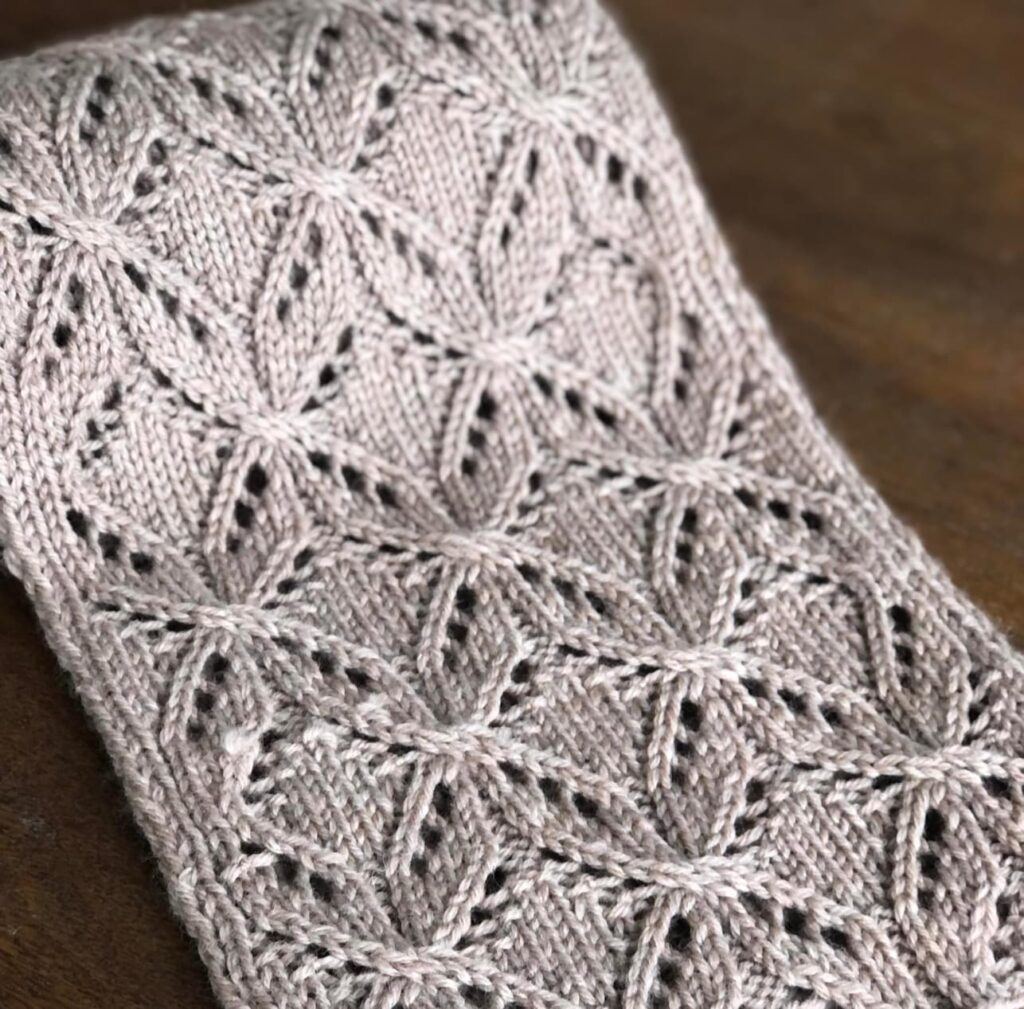
Inspiration
I want to be transparent about this. The main stitch pattern came from the Japanese lace stitches dictionary. Japanese stitches are so delicate and detailed. There are some Japanese knit stitch dictionaries published by Nihon Vogue, which are translated into English. I highly recommend checking it out if this is the first time you have seen it. It will give you so much inspiration. These are few of my favorite!
- 280 Japanese Lace Stitches
- Japanese Knitting Stitch Bible: 260 Exquisite Pattern
- 250 Japanese Knitting Stitches
Construction
The construction of this scarf is straightforward, just like a standard scarf. It is knitted from the bottom up. I’ve used slip-stitch salvage to make a neat and smooth edge.
You might think it is a complicated pattern made for advanced knitters by looking at it. But actually, it is constructed with very basic stitches like YO and K2tog. The 6 stitches cable could be hard on some people. But I go over the stitch in the knit-along video listed below. Also, There are detailed tutorials available for the cable stitch along with all other stitches used in this pattern.
Check out my Youtube Channel 😊
Because of the cable stitch, the test knitters rated this pattern easy-medium level.
Yarn Used
I used Cascade 220 superwash. This is one of the most popular yarns I see in many yarn stores. It is 100% superwash wool, so you can still enjoy the benefit of the wool but be able to machine wash it for easy care. This yarn is in between DK and worsted wt. It’s like light worsted. It is soft and gives beautiful stitch definitions. So I love using this for cable knitting. Another amazing fact is that this yarn comes in over 200 different shades. I used the colorway beige no. 1926 for the finished scarf. You can also use any similar-weight yarn and your favorite color to make this scarf. Test knitters have used the following yarn:
- KnitPicks Chroma Worsted
- Patons Kroy Socks (Held double)
- Happy Sheep Woolpower Print
- Berroco Ultra Wool Worsted

Pattern
- Get the ad-free, printable PDF pattern: Click HERE for the Etsy shop
- Add to your Ravelry Queue: Click HERE (Ravelry download also available with a purchase)
- Save this pattern for your future project on Pinterest: Click HERE to pin.

Materials
- US 7 (4.5mm) Knitting Needles
- Worsted Wt. Yarn. Approximately 440 yards.
- 1 or 2 cable needles
- Tapestry Needle
Gauge and Finished Measurement
- 4″ x 4″ = 20 sts x 26 rows in stockinette
- The finished item measures approximately 67″ x 7″ after being blocked
Abbreviation
💡 Click the highlighted letters for tutorials.
CN: Cable Needle
k: Knit
k2tog: Knit 2 stitches together.
p: Purl
Sl: Slip 1 stitch purlwise with yarn at the back.
Sl wyif: Slip 1 stitch purlwise with yarn in front.
ssk: Slip, slip, knit
yo: Yarn over
2/2/2 LPC: Slip next 2 sts on CN, hold to front, slip next 2 sts on a second CN, hold to back; k2; p2 from back CN, then k2 from front CN.
2/2/2 RPC: Slip next 2 sts on CN, hold to back. Slip the next 2 sts on another CN, also hold to back; k2: p2 from the second CN, then k2 from the first CN.
Pattern
Set up rows
CO 48 sts using preferred method.
Row 1 (RS): Sl, Knit to the end.
Row 2 (WS): Sl wyif, (p2, k1) × 2, p6, (k1, p2, k2, p2, k1, p6) twice, k1, p2, k1, p3.
Lace Pattern
Proceed to the chart or the written instructions.
Work row 1 – 28 of the chart 15 times or until the project measures your preferred length. On the last repeat, stop at row 26.
Note:
The 14 sts motif repeats itself 2 times on each row. If you would like a wider scarf, you can add a repeat.
The first st of every row is always a slip stitch to create neat edges.
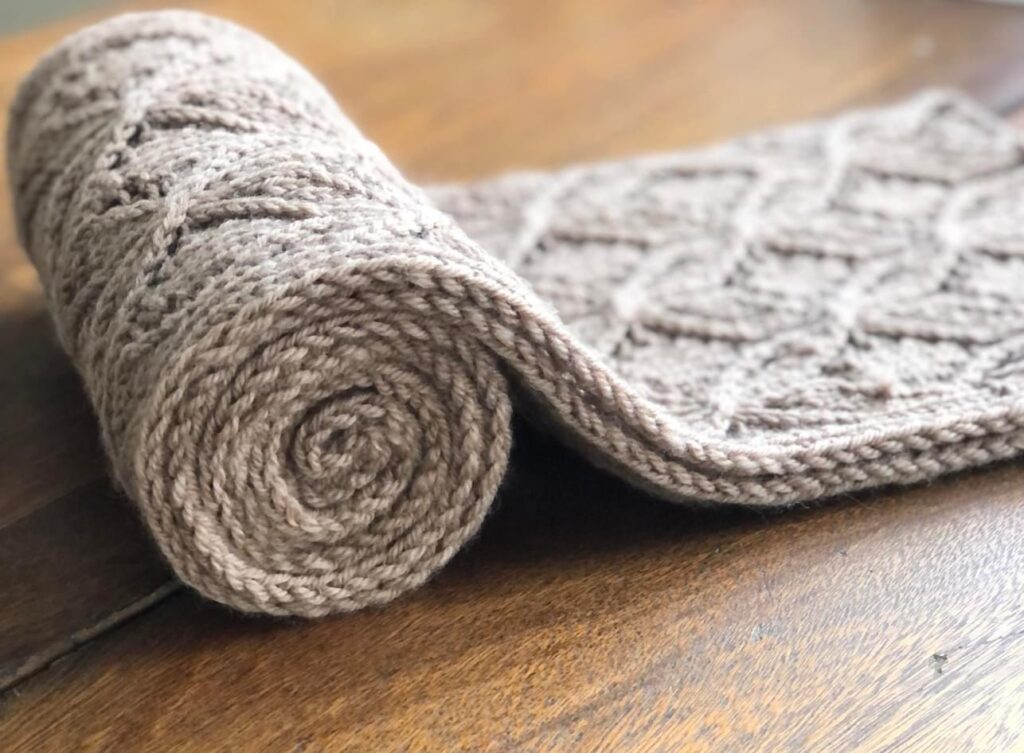
Finish
Row 1 (RS): Sl, (k2, p1) × 2, (k6, p1,k2, p2, k2, p1) twice, k6, p1, k2, p1, k3.
Row 2 (WS): Sl wyif, P to the end.
Bind off all sts, and weave in the ends.
Lace Pattern Chart
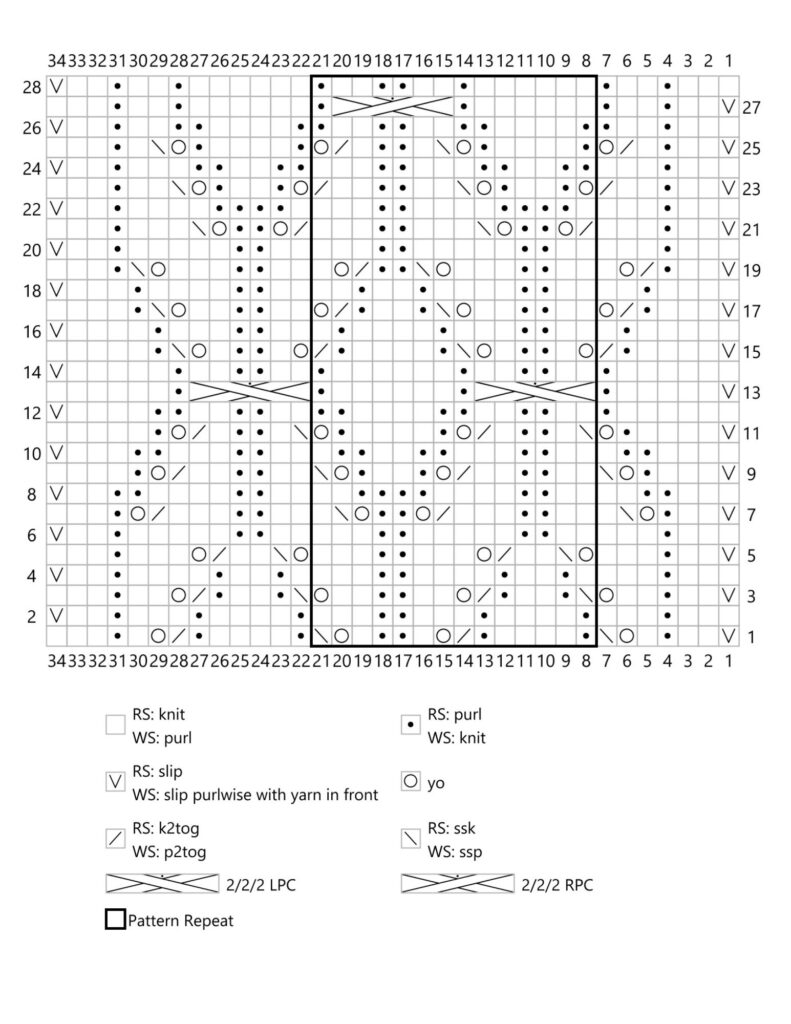
Lace Pattern Written Instructions
Row 1 (RS): Sl, k2, p1, k1, yo, ssk, (p1, k4, p1, k2tog, yo, k1, p2, k1, yo, ssk) twice, p1, k4, p1, k2tog, yo, k1, p1, k3. (48 sts)
Row 2 (WS): Sl wyif, p2, k1, p3, k1, p4, k1, (p3, k2, p3, k1, p4, k1) twice, p3, k1, p3.
Row 3: Sl, k2, p1, k2, yo, (ssk, p1, k2, p1, k2tog, yo, k2, p2, k2, yo) twice, ssk, p1, k2, p1, k2tog, yo, k2, p1, k3.
Row 4: Sl wyif, p2, k1, p4, k1, p2, k1, p1, (p3, k2, p4, k1, p2, k1, p1) twice, p3, k1, p3.
Row 5: Sl, k2, p1, k3, (yo, ssk, k2, k2tog, yo, k3, p2, k3) twice, yo, ssk, k2, k2tog, yo, k3, p1, k3.
Row 6: Sl wyif, p2, k1, p5, k2, p2, (p3, k2, p5, k2, p2) twice, p3, k1, p3.
Row 7: Sl, k2, p1, yo, ssk, k1, (k2, p2, k3, k2tog, yo, p2, yo, ssk, k1) twice, k2, p2, k3, k2tog, yo, p1, k3.
Row 8: Sl wyif, p2, k2, p4, k2, p2, (p2, k4, p4, k2, p2) twice, p2, k2, p3.
Row 9: Sl, k3, p1, yo, ssk, (k2, p2, k2, k2tog, yo, p1, k2, p1, yo, ssk) twice, k2, p2, k2, k2tog, yo, p1, k4.
Row 10: Sl wyif, (p3, k2) × 2, p2, (p1, k2, p2, k2, p3, k2, p2) twice, p1, k2, p4.
Row 11: Sl, k4, p1, yo, (ssk, k1, p2, k1, k2tog, yo, p1, k4, p1, yo) twice, ssk, k1, p2, k1, k2tog, yo, p1, k5.
Row 12: Sl wyif, p4, (k2, p2) × 2, (k2, p4, (k2, p2) × 2) twice, k1, p6.
Row 13: Sl, k5, p1, (2/2/2 LPC, p1, k6, p1) twice, 2/2/2 LPC, p1, k6.
Row 14: Sl wyif, p5, k1, p2, k2, p2, (k1, p6, k1, p2, k2, p2) twice, k1, p6.
Row 15: Sl, k4, p1, k2tog, (yo, k1, p2, k1, yo, ssk, p1, k4, p1, k2tog) twice, yo, k1, p2, k1, yo, ssk, p1, k5.
Row 16: Sl wyif, p4, k1, p3, k2, p2, (p1, k1, p4, k1, p3, k2, p2) twice, p1, k1, p5.
Row 17: Sl, k3, p1, k2tog, yo, (k2, p2, k2, yo, ssk, p1, k2, p1, k2tog, yo) twice, k2, p2, k2, yo, ssk, p1, k4
Row18: Sl wyif, p3, k1, p4, k2, p2, ((p2, k1) × 2, p4, k2, p2) twice, p2, k1, p4.
Row 19: Sl, k2, p1, k2tog, yo, k1, (k2, p2, k3, yo, ssk, p2, k2tog, yo, k1) twice, k2, p2, k3, yo, ssk, p1, k3.
Row 20: Sl wyif, p2, k1, p5, k2, p2, (p3, k2, p5, k2, p2) twice, p3, k1, p3 .
Row 21: Sl, k2, p1, k3, (k2tog, yo, p2, yo, ssk, k3, p2, k3) twice, k2tog, yo, p2, yo, ssk, k3, p1, k3.
Row 22: Sl wyif, p2, k1, p4, k4, p1, (p3, k2, p4, k4, p1) twice, p3, k1, p3.
Row 23: Sl, k2, p1, k2, k2tog, (yo, p1, k2, p1, yo, ssk, k2, p2, k2, k2tog) twice, yo, p1, k2, p1, yo, ssk, k2, p1, k3.
Row 24: Sl wyif, p2, k1, p3, k2, p2, k2, ((p3, k2) × 2, p2, k2) twice, p3, k1, p3.
Row 25: Sl, k2, p1, k1, k2tog, yo, (p1, k4, p1, yo, ssk, k1, p2, k1, k2tog, yo) twice, p1, k4, p1, yo, ssk, k1, p1, k3.
Row 26: Sl wyif, p2, k1, p2, k2, p4, k1, (k1, (p2, k2) × 2, p4, k1) twice, k1, p2, k1, p3.
Row 27: Sl, (k2, p1) × 2, (k6, p1, 2/2/2 RPC, p1) twice, k6, p1, k2, p1, k3.
Row 28: Sl wyif, (p2, k1) × 2, p6, (k1, p2, k2, p2, k1, p6) twice, k1, p2, k1, p3.
If you enjoyed this free pattern, please buy me a coffee to support my work 😊 It will help me create more free knitting patterns and tutorials.
Please come follow me on Instagram, Ravelry, and Pinterest to get updates! Also, join the Facebook or Ravelry group “Palmeri – LOVE to knit Group” to meet more knitters! I would be so grateful if you could share your finished projects on these platforms to spread the word💗


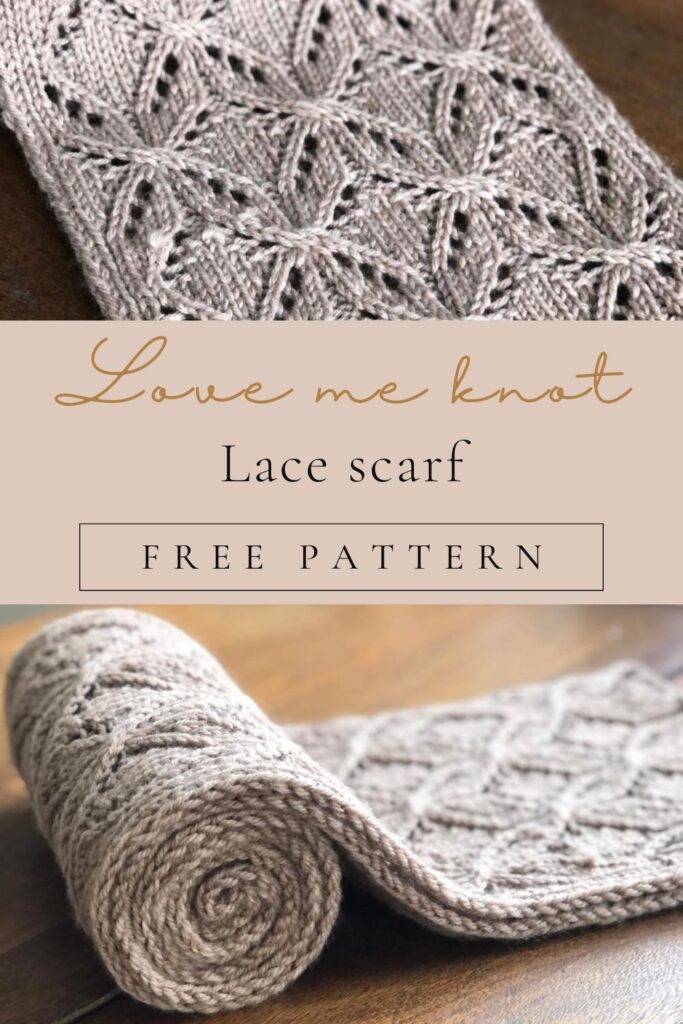

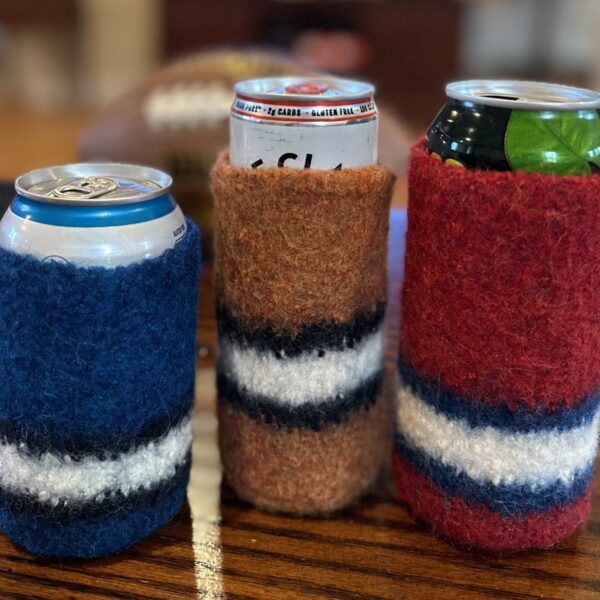
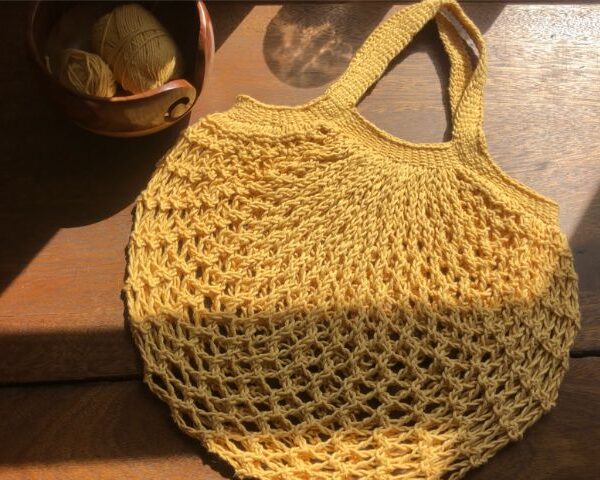
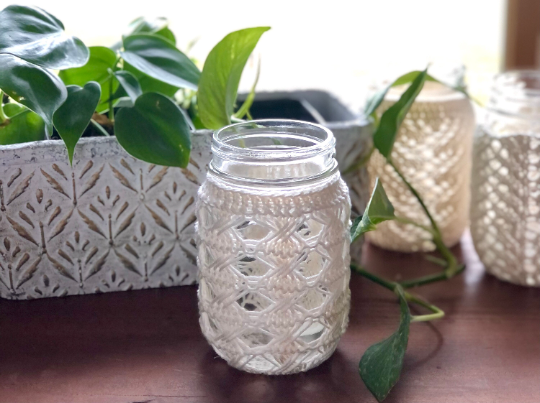

This is a beautiful pattern. Well written and the photos, wow!
What a great project for any skill level.
Thank you so much Karen! 🙂